Lewis Hamilton on Monaco 2019: 'I think it's the hardest race I've had'
- Published
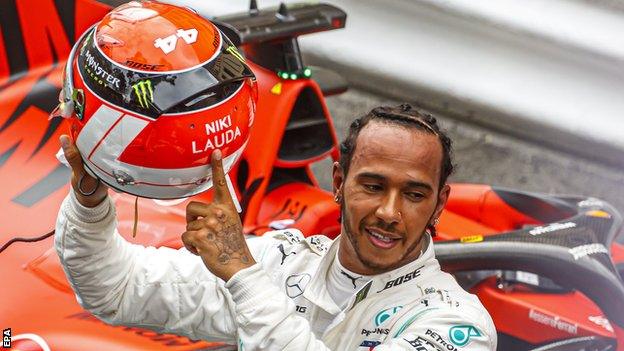
Lewis Hamilton holds up his helmet in tribute to Niki Lauda
Lewis Hamilton really had to work for this one.
A glance at the results of the Monaco Grand Prix - Mercedes' sixth straight win this year, Hamilton's fourth victory in six races, leading lights to flag - makes it look easy. But it was anything but.
Mercedes - pretty much flawless all season so far - made their first big mistake of the year. They put Hamilton on the wrong tyres at his pit stop, and that left him facing a rear-guard battle with rapidly deteriorating grip, and the most aggressive driver in Formula 1 right behind him.
Overtaking is close to impossible in Monaco, but that should take nothing away from the quality of Hamilton's drive.
"He saved us," Mercedes F1 boss Toto Wolff said afterwards. "His driving saved us."
Hamilton said afterwards: "I think it was the hardest race I've had. I've had a lot of races but globally, in the car and with the tyres, the strategy, with Max (Verstappen) behind, it was the biggest challenge I think I've had and I'm really grateful I was able to pull it off."
It was a drive reminiscent of Ayrton Senna holding off Nigel Mansell's Williams in the closing laps of Monaco in 1992, after the Briton had closed at five seconds a lap after a late tyre change. Or Daniel Ricciardo holding off Sebastian Vettel to win for Red Bull last year despite a power loss of more than 160bhp.
What did Mercedes do wrong?
The incident that changed the race - and turned Hamilton's afternoon from what would have been a relatively easy cruise to the flag into a nerve-fraying fight that tested him to the limit - was the safety car being deployed so officials could clean up the debris strewn around the circuit as a flailing tyre on Charles Leclerc's Ferrari smashed his car's floor to pieces.
The race was only 11 laps old. There were still 67 laps to go. All the leaders pitted, but while Red Bull and Ferrari put Max Verstappen and Sebastian Vettel on to the 'hard' compound tyre, Mercedes chose the 'medium' for Hamilton and team-mate Valtteri Bottas.
"It was obviously the wrong call," Wolff admitted. Ferrari team boss Mattia Binotto said he was "surprised", given how much further there was to go. Mercedes were about to find out why.
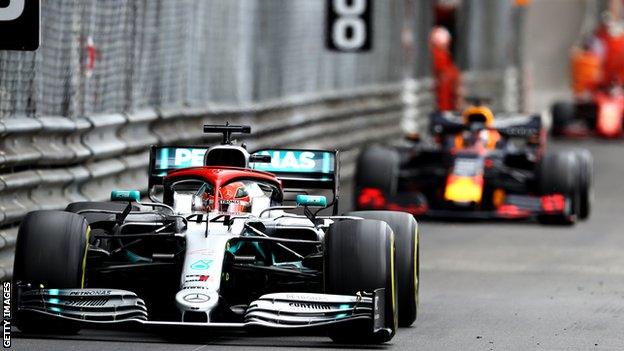
Mercedes chief strategist James Vowles had wise words for Hamilton over the team radio: "You can do it if you trust it."
The thinking was straightforward enough. Mercedes' projections said that if they pitted at any time from lap 15 or 16 onwards, the tyre would make it to the end as long as the drivers were careful with it.
"It didn't even seem like a huge stretch," Wolff said. "But we realised 20 laps into the race (stint) that on the left front some graining appeared and he started to complain about the understeer from the graining and it would get very difficult to make it to the end."
Graining is where the surface tears and reduces grip. Hamilton began to come on to the radio to express his doubts that the tyres would last. And his messages became increasingly frantic, until ultimately he said it would take a "miracle" to make it.
"We had quite some discussions about the tyre lasting another 40 laps and I was reminded it was only 20 laps on a normal circuit so calm down a bit," Wolff said.
"But everybody knew it would be a huge stretch and I believe 20 laps from the end he had 0% rubber with massive understeer. You could see around Loews (hairpin), the car wouldn't turn any more."
In the car, Hamilton was thinking about how much the win would mean - to him, to the team, especially just six days after they had lost non-executive director Niki Lauda, who died on Monday.
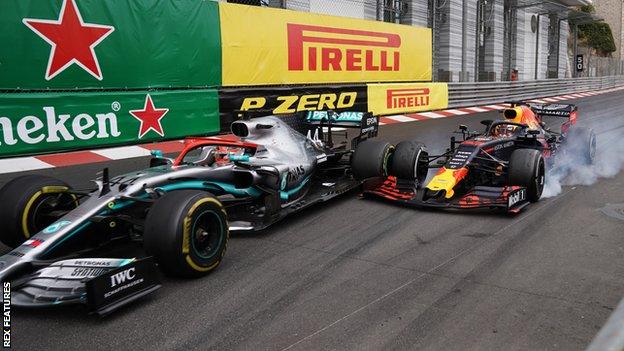
Hamilton and Verstappen bumped wheels at the chicane on lap 77
"So much came into my mind," he said. "I had 38 laps to go and with these tyres [I was thinking] I'm not going to make it. But I wasn't going to stop. I was leading by 20 seconds here a few years ago and pitted and came out third, and your heart just sinks. So I was like: 'I'm not coming in, whatever the case. I'm just going to drive around with no tyres until they blow up.'
"With sheer will I just kept pushing. I really, really tried my best to stay focused and not crack under pressure."
The longer the race went on, the harder it became for Hamilton. Verstappen, behind, was biding his time, waiting for an opportune moment. Into the last 10 laps, he began to pile on the pressure, climbing all over the back of Hamilton's car, nearly running into him more than once. He finally tried a move at the chicane with three laps to go.
It nearly worked. He got his front wheels inside Hamilton's rears, they touched as the Mercedes turned in. Hamilton survived by going straight on to ensure the incident didn't take both of them out, and that was effectively that.
"I just really wanted to do the job, and deliver for Niki," Hamilton said. "I also wanted to pull it through for the team because so many guys back at the factory deserved it. Proud of today."
Why did they make the call?
In the context of the weekend, Mercedes felt their tyre call would be the right one - as they made it.
They wanted to avoid the hard for three reasons: It had been an awkward tyre to use when teams tried it in practice on Thursday; they were worried they would be vulnerable at the restart if the drivers behind them chose the mediums; and rain was in the air, and the medium, as a softer tyre, would be better in damp conditions.
But the tyre simply did not have the durability to last at a normal pace. They held their hands up afterwards, and they were left relying on Hamilton to ensure that that winning run continued - even if the sequence of one-twos was lost to an unsafe release from Red Bull that led to Bottas getting a puncture as he and Verstappen left the pits side by side.
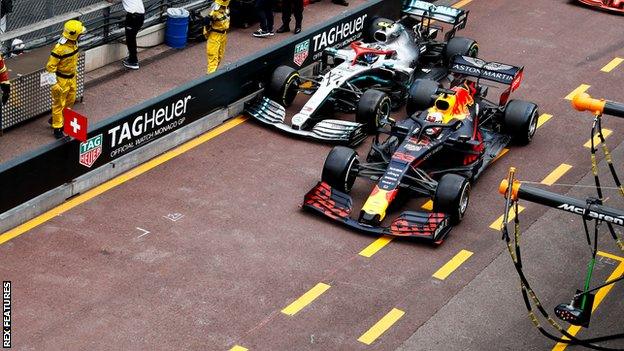
Bottas claimed a podium place following Verstappen's five-second time penalty
Hamilton usually demurs when he's asked how to rank a race, says it is difficult to remember them all, is reluctant to call anything his best or toughest, usually adds the qualifier "one of". So it means something when he talks as close as he is ever likely to in absolutes.
"I believe it is in the top five (wins) and I think it is the hardest I have ever had," he said. "I still can't believe I managed to get it to the end. (There were) so many opportunities to make a mistake, to give up, to make an excuse."
Hamilton barely drinks, but he would he admitted "definitely have a glass of wine. Or a few."
A rare show of vulnerability
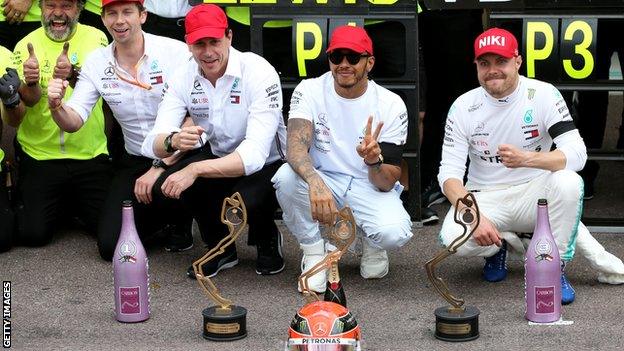
He was all smiles post-race but Wolff admitted Mercedes had faults in Monaco, saying: "The tyre choice was the wrong one but we rarely make mistakes like this."
In a year that Mercedes have dominated so far, Monaco demonstrated how fine can be the line between victory and defeat.
After their fifth consecutive one-two in Spain last time, the talk was all about whether they can become the first time to go through the season undefeated. Wolff seized on the opportunity Monaco provided to issue a reality check.
"We were close to losing today," he said.
Who would take responsibility for failing to secure the one-two, a journalist asked with his tongue in his cheek?
Wolff laughed. "I take full responsibility," he said. "We need to keep both feet on the ground. We are laughing about it but what you can see is teams have stopped winning once they had a sense of entitlement and believed it was normal.
"It is not normal. One-twos and one-threes are not normal for the highest competition in motor racing so we are constantly expecting to hit road bumps and we take it and continue to push flat out for the next one."
In reality, all things being equal, Mercedes are likely to remain extremely hard to beat. Their car has proved ultra-competitive on all types of tracks, and it's becoming clear a perfect storm of unintended consequences has led to this situation.
Two technical changes for 2019 have played right into Mercedes' hands.
The introduction of new front wing rules aimed at making overtaking easier has fundamentally changed the way air flows over the cars, and made a car in Mercedes' style the perfect one for the new regulations. The Ferrari and Red Bull follow a different philosophy, and work in a different way, and it has cost them performance.
Secondly, tyres with a thinner tread, introduced to give more durability and allow drivers to push harder in races, have made it more difficult for teams to get the rubber up to the right operating temperature.
This, too, has inadvertently helped Mercedes, whose problem for the last few years has been keeping their tyres from overheating, and hindered Ferrari, who previously have been much better able to control tyre temperature, but are now struggling to generate enough.
To that, as Binotto said "there are no magic solutions". But at least Mercedes have shown at last that they have some human fallibility about them this year.
